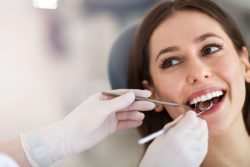Though most people get a cavity at least once in their lives, they might not realize that a cavity is an early stage of tooth decay and that without prompt treatment, decay will cause severe and irreversible damage to their smiles. Good oral hygiene can keep decay at bay. But you might participate in activities that will put your smile at risk regardless of this preventative care.
Staying aware of which actions can increase this risk can help you preserve your oral health. Read on to learn about three oral habits that could put your teeth in danger of decay and other dental problems.

Which Behaviors Could Worsen Tooth Decay?
Consuming Acidic Food Items
Your diet plays a major role in your overall well-being. This proves true when it comes to your dental health too. Tooth decay occurs when oral bacteria penetrate weakened areas of the enamel, or outer layer of the tooth, to eat away at your smile. Acidic foods and drinks, like citrus fruits and juices, will erode the tooth enamel when you consume them. This will make the teeth vulnerable to decay over time.
Sugar becomes acidic when it reacts with saliva and will similarly eat away at your teeth when you eat it. Dentists ask their patients to limit acidic and sugary items in their diet to preserve their dental health. Though a dentist can treat a cavity with a dental filling, ideally, you should protect your natural dental structure as much as possible.
Using Tobacco
Smoking, chewing, or otherwise using tobacco will introduce toxins into the body that can cause many health issues, including with your teeth. Nicotine from tobacco will lower saliva production, leaving you with a condition called dry mouth.
Not only does this feel uncomfortable, but it will allow bacteria to spread with greater ease. Then bacteria can better access weak spots in your teeth to form decay. Prevent cavities and advanced decay by stopping behaviors like smoking that can cause dry mouth.
Clenching or Grinding Teeth
Many people have a habit of clenching or grinding their teeth, a behavior known as bruxism. The grating of the teeth against one another will wear down the enamel, making the smile vulnerable to decay and other dental dangers. If you grind your teeth, this act is more than an annoyance: it could majorly damage your smile.
Stress relief activities can reduce tension throughout the body which can lead to bruxism. Your dentist might give you a night guard to cushion the teeth against grinding that may occur during sleep.
Sometimes, bruxism occurs due to alignment issues in the teeth or jaw. A dentist can straighten the smile to amend minor bite problems using Invisalign. But severe malocclusions might need treatment from an orthodontist.
Schedule a consult with your dentist to determine the best way to resolve your bruxism habit and protect your dental health. Ignoring this behavior could heighten your chances of suffering a dental emergency.
